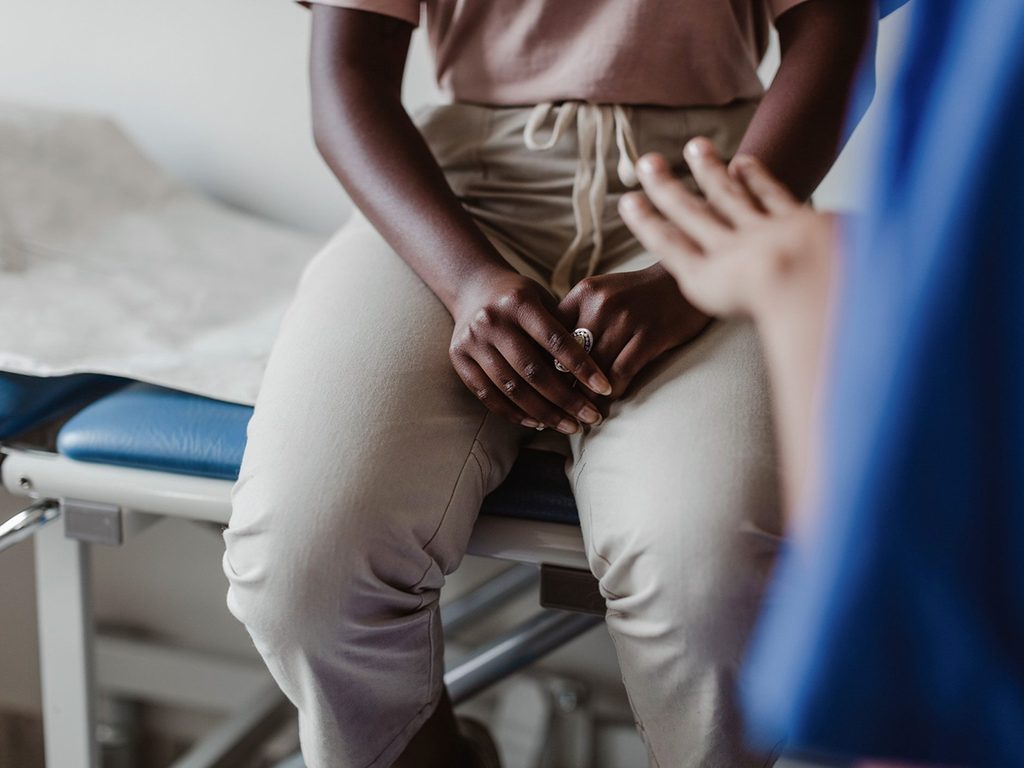Are You a Hypochondriac? How to Tell If Health Anxiety Is a Problem

Once known as hypochondriasis or hypochondria, an overwhelming fear of being sick is actually called illness anxiety disorder. Here are the signs and symptoms of this mental health condition.
When anxiety about health is a condition itself
With the threat of a second coronavirus wave and the start of cold and flu season, it’s easy to worry that each sore throat, cough or headache may turn out to be something far worse. You consult Dr. Google as you frantically type in all of the symptoms you have—or think you have.
It’s important to note that worrying about COVID-19 is “being appropriately nervous about your health,” according to Steven L. Dubovsky, MD, professor and chair in psychiatry at the University at Buffalo in Buffalo, New York.
However, there are some instances where preoccupation about your health evolves into an obsession and an unrealistic fear. Healthy anxiety, once known as hypochondria or hypochondriasis (a person with hypochondriasis would be a hypochondriac), is now known as illness anxiety disorder. (Here’s what to do if you’re waking up with anxiety at night.)
“Hypochondriasis refers to a preoccupation with having an illness that you either don’t have or a preoccupation that whatever illness you do have is much worse than it actually is,” says Dr. Dubovsky.
Our panel of experts explains everything you need to know about illness anxiety disorder, including the causes, symptoms, and treatments, as well as how to tell if your health concern is rational or irrational.
What is illness anxiety disorder?
You might joke that someone is a hypochondriac if they have a rash or ache and are convinced it’s something incredibly serious, but like any mental health condition, health-related anxiety is anything but funny.
Hypochondria was updated in the Diagnostic and Statistical Manual of Mental Disorders 5th Edition (DSM-5) to illness anxiety disorder. The definition: A “preoccupation with having or acquiring a serious illness.”
For instance, you may constantly check your body for signs of illness. Your mind may also jump immediately from “A to Z,” says Susan Albers-Bowling, a psychologist at the Cleveland Clinic in Wooster, Ohio.
For example, you may think your cough is actually lung cancer and then you develop obsessive thoughts about it that interfere with your day-to-daily activities. So, how do you tell the difference between illness anxiety disorder and a legitimate health concern? A legitimate health concern can be something that you can easily see or measure. (Here are eight signs that you could have Obsessive-Compulsive Disorder.)
For example, if you have a high fever of 103 F (39.4 C) or more, this is a legitimate concern that warrants a visit to your doctor immediately.
Somatic symptom disorder is a related disorder. Here, you actually experience physical symptoms like pain or shortness of breath, that may or may not be related to a health condition.
The feelings related to those conditions are so excessive and distressing that they can occupy your thoughts and behaviours, and even compromise your ability to live your life, explains the American Psychiatric Association. This disorder usually begins by age 30.
What causes illness anxiety disorder?
Illness anxiety disorder can be a way of solving past problems by having a preoccupation with your bodily functions, says Dr. Dubovsky.
“True hypochondriasis usually occurs in people who were deprived throughout childhood and have a constant feeling as an adult in not being cared for. It’s a way of legitimizing these dependency needs that someone doesn’t feel comfortable meeting in other ways,” he says.
The U.S. National Library of Medicine notes that this may also stem from a history of physical or sexual abuse. This isn’t the case for everyone, however, and you don’t necessarily have to have this type of history to develop illness anxiety disorder.
Symptoms and diagnosis of illness anxiety disorder
Some anxiety over your health is a good thing because it motivates you to see a doctor and stick with treatment, says Bowling.
According to the U.S. National Library of Medicine, you may have illness anxiety disorder if:
- You believe that any symptom or sensation is a sign of a serious illness
- You regularly see doctors for reassurance that you are not ill. (You may also ask friends and family)
- Your symptoms are vague and may change
- You regularly examine your own body for signs and symptoms something is wrong
According to the American Psychiatry Association, you may have somatic symptom disorder if:
- You have one or more physical symptoms that are causing you distress in everyday life
- You have obsessive and out-of-proportion thoughts about the symptom
- You have high anxiety about your health
- You spend excessive time on your symptoms
Know that the very stress of worrying about your symptoms can trigger anxiety symptoms that feel like something is wrong, like irritable bowel, nausea, fatigue, aches and pains.
“People are often experiencing real, genuine symptoms, some of which are created by the stress of worrying about it,” says Bowling.
To diagnosis illness anxiety disorder, your doctor will do a physical exam to see if you have any of the health conditions you’re worried about.
If you don’t, your doctor will likely refer you to a mental health professional for a psychological evaluation. (These are the signs you could use the help of a therapist.)
Treatment for illness anxiety disorder
Treatment for illness anxiety disorder usually addresses your symptoms and how to deal with them on a day-to-day basis so they don’t interfere with your life.
Psychotherapy and medication are typically recommended to ease the unsubstantiated fear and worry triggered by this anxiety. Here’s what you need to know about treatment options.
Psychotherapy
Cognitive behavioural therapy (CBT) focuses on reframing your thoughts to dial down anxiety. “Your mind is catastrophizing the situation,” says Bowling. Catastrophizing is when your mind races to the very worst possible outcome of a situation; you may be convinced that you are in grave, life-threatening danger, even if it’s the least likely explanation for your symptoms.
A therapist, she says, can teach you strategies to be less reactive to fearful thoughts and better cope with anxiety. For example, you might use deep breathing techniques rather than calling your doctor right away. If the symptom is still there for three days, then you might call. (Read these tips on how to get the most out of therapy.)
Acceptance exercises can also help. The goal of worry is often to prevent something bad from happening, but it’s important to realize that not everything is within your control, says Bowling.
Controlled worrying (done within the constraints of a specific time period) will allow you to worry but prevent the all-day anxiety cycle that can consume your mind.
Medication
Medication to treat anxiety, including serotonin specific reuptake inhibitors (SSRIs) or serotonin-norepinephrine reuptake inhibitors (SNRIs) can help, specifically those used for obsessive-compulsive disorder like fluoxetine (Prozac) or venlafaxine (Effexor).
SSRIs work to promote serotonin, known as the “feel-good” brain chemical, while SNRIs function to increase the release of both serotonin and norepinephrine, which promotes alertness and energy. It’s important to talk with your doctor about potential side effects from these drugs.
Lifestyle changes
One of the most important things you can do is to quit Googling your symptoms, although that can be difficult.
“Leave the diagnosis to the doctors,” says Bowling. Talk to your doctor if you need help limiting your electronic use.
Patients should also have one primary care physician in order to minimize tests and treatments, says the U.S. National Library of Medicine.
Stress reduction strategies, including exercise, meditation, maintaining a healthy diet and getting enough sleep can also help lessen anxiety. (Here are 10 possible medical reasons why you can’t sleep.)
Complications and prognosis from illness anxiety disorder
If not treated, illness anxiety disorder or somatic symptom disorder can spiral into obsessive doctor’s appointments, bouncing around from doctor to doctor trying to find the cause of your symptoms, or seeking out multiple tests or scans.
“This can be time-consuming and expensive and may exhaust your health insurance,” says Bowling.
Even more severe: If you get enough tests, eventually one of them may show an abnormality, and you can be harmed by unnecessary follow-up tests or even unneeded exploratory surgery, all of which can cause complications, adds Dr. Dubrovsky.
However, with treatment, which may include CBT and/or medication and some lifestyle changes, you can learn to let go of the excessive worry and anxiety in hypochondriasis and learn to cope in a productive way, says Bowling.
Next, learn about autumn anxiety and how to cope.






